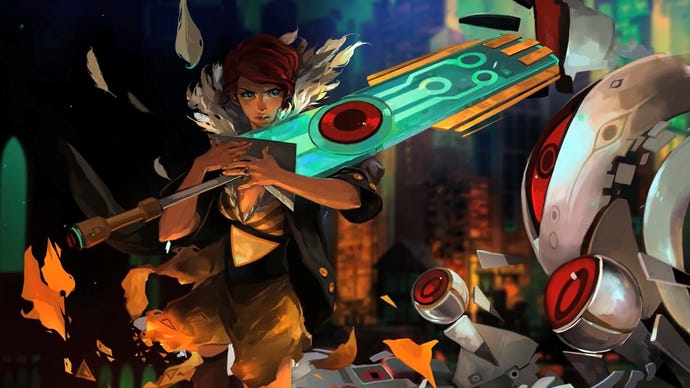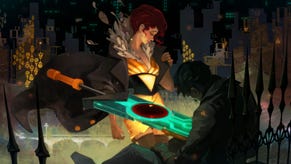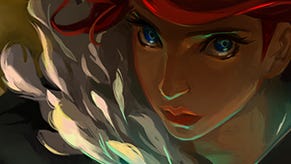Transistor review: SuperGiant makes its stunning PS4 debut
Transistor developer SuperGiant Games had a hard act to follow with its previous release Bastion, but Dave Cook feels you have nothing to worry about.
”If I had to quickly compare Transistor's combat to another game’s battle system, I’d say it falls close to Square’s original Parasite Eve game. That’s definitely a good thing.”
If you're fed up with sequels and overly-familiar ideas you might want to give Transistor a look-see, as it's one of those rare titles that boasts unique artistic direction, intriguing gameplay concepts and an engrossing plot to match. Games like this only come around so often and make the big releases feel dull by comparison. It deserves to be played.
Where SuperGiant's debut Bastion presented players with real-time combat that veered towards hack-and-slash country, Transistor is a more tactical affair. It takes place in the utopian city of Cloudbank, a neon-lit swell of artisan architecture and cultural opulence that has become infested by an army of automatons known as the Process. To make matters worse, whole sectors of the metropolis are disappearing, and somehow a mysterious sword known as the Transistor is the key to it all.
It falls into the hands of Red, a former starlet of Cloudbank who has lost her voice and finds herself pursued by the Process. SuperGiant's decision to cast a mute lead is quite ingenious, as your only guiding voice is the Transistor itself. Like Bastion's narrator, the device comments on occurrences in the world and reacts to the player's actions on cue to give them greater insight into the world and to drip-feed exposition along the way. It's a superb narrative tool.
The plot is ambiguous at the outset, but as you progress you'll gain a deeper understanding of what the Transistor is and how it relates to Red's plight. I won't spoil too much here, but it's a great story that offers twists and turns as you go, either through news terminals dotted around the environment, audio messages left by the shadowy Camarata organisation or lavish cut-scenes.
All of the story-telling is threaded through combat, which is dispensed through real-time battles that can be paused to cue up tactical attacks and movements using a mechanic called Turn(). If I had to quickly compare it to another game's battle system, I'd say it falls close to Square's original Parasite Eve game. That's definitely a good thing.
”SuperGiant’s learning curve is steep at points, but it forces you to think laterally about combat. Once ranged, area-of-effect, buffing, shielding and healing enemies come into play, you’ll be thankful for taking time to learn the rules.”
Because the Transistor is heavy, Red's attacks are quite slow when you're simply spamming commands, and while this works against low-level Process robots, you'll find that you'll need to plan each move meticulously once ranged droids and those with healing and defensive buffs enter the equation.
Each Turn() speeds up Red's movement considerably and comes with a gauge that fills as you move her around the battle area or initiate attacks. Once satisfied or out of meter you can unleash your moves in rapid sequence, but it'll take time before you can pause the action again. You have to think about cool-down very carefully, and I found myself overcome with relief after barely surviving some of the game's harder encounters. It's a gratifying experience.
Here's a practical battle example: I can pause the action using Turn() then spend some gauge walking up to a Process and hit it with Crash() to inflict stun and lower its defence. I can then walk around the target to get a damage boost by back-stabbing it with Breach(), before using Jaunt() to sprint behind the nearest piece of cover. Not only will this let me escape any follow-up attacks, it can also make the enemy lose sight of me, allowing time for my next Turn() to recharge.
It gets deeper as Red levels up and unlocks new abilities that can either be used as attacks or slotted as either passive or active buffs. Take Bounce(), a ranged projectile that ricochets between targets to inflict damage. I found that by stacking it with Switch(), a move that turns enemies into allies for a short time, I could fire off a shot that bounced between a group of targets to render them friendly until my next Turn() charged. It's genius.
Or instead of using Jaunt() as a sprint move, I can equip it as a passive ability that reduces my Turn() recharge time, or couple stealth skill Mask() with rapid-shot ability Ping() to dispense a savage burst of heightened back-stab blows. There are so many possibilities in there, and just like Bastion you can equip Limiters to make enemies harder but increase your XP gain. It's a superb risk-reward mechanic that really does pile on the pressure as you progress, and makes you scrutinise every battle that little bit more.
”Do yourself a favour and seek out Transistor to remind yourself that this industry’s imagination isn’t all dried up; you just need to look away from the dizzying shadow of those tired blockbusters to see it.”
SuperGiant's learning curve is steep at points, but it forces you to think laterally about combat. Once ranged, area-of-effect, buffing, shielding and healing enemies come into play, you'll be thankful for taking time to learn the rules.
Fighting aside, what you have here is a beautifully-depicted, emotionally engaging journey that splices passive horizon-gazing and narrative with bouts of tense, considered fighting, while smacking you with peaks and troughs of pressure at just the right tempo to keep things interesting.
The studio ditched publishers for the release of Transistor, but I don't think the game will be a hard sell without the might of a big company behind it. If there's any justice in the world this game will shift units due to its many qualities, and will hopefully sit in stark contrast to the endless cycle of sequels and uninspired ideas that continue to bog the AAA world down.
Do yourself a favour and seek out Transistor to remind yourself that this industry's imagination isn't all dried up; you just need to look away from the dizzying shadow of those tired blockbusters to see it.
Disclosure: to assist in writing this review, SuperGiant Games sent Dave a PS4 download code for Transistor.





.jpg?width=291&height=164&fit=crop&quality=80&format=jpg&auto=webp)



